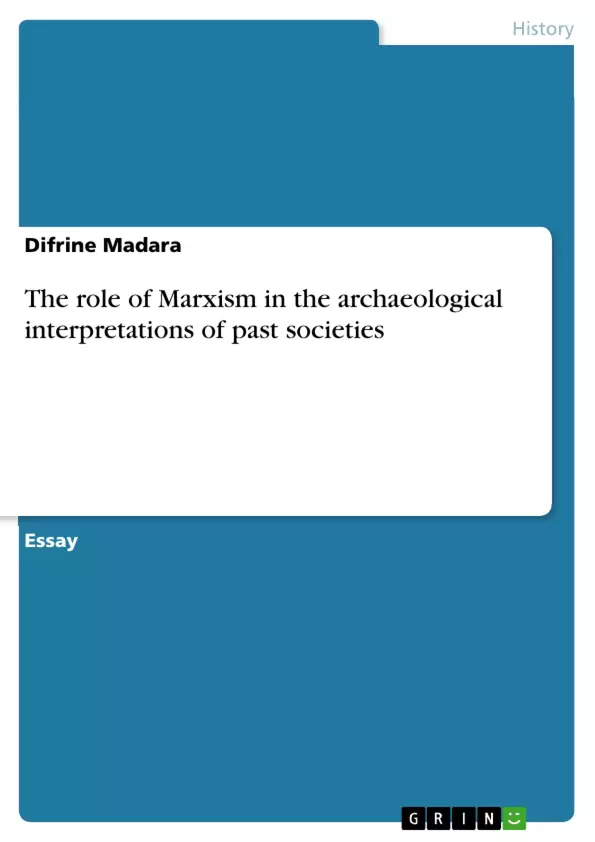The author argues that Marxism still plays an important role in the interpretation of archaeological discoveries in the contemporary world. In support of this argument, the author examines the benefits and pitfalls of Marxist thinking in archaeological interpretations of past societies.
Marxism archaeology influenced the development of new ideas which were consistent with social deconstruction and post-modernism. In this case, Marxists created a more inclusive archaeology leading to the rise in the number of indigenous archaeologists around the world leading to greater diversity in this field of study. Furthermore, Marxist archaeology provides a framework where individual interests of a particular social class can be discussed. For instance, Marxist archaeology is valuable in explaining how the top one percent in the society used religion to control the masses.
Table of Contents
- Introduction
- Analysis and discussion
- Conclusion
Objectives and Key Themes
This text examines the benefits and pitfalls of applying Marxist thought to archaeological interpretations of past societies. It aims to assess the value and limitations of Marxist archaeology in understanding social change and power dynamics in historical contexts.
- The strengths and weaknesses of Marxist archaeology compared to processual archaeology.
- The role of class struggle and ideology in shaping social change.
- The limitations of linear social evolution models in understanding past societies.
- The contribution of Marxist archaeology to a more inclusive and diverse field.
- The use of archaeological evidence to understand power dynamics and social relations in past societies.
Chapter Summaries
Introduction: This introductory chapter sets the stage by contrasting processual and post-processual archaeology, highlighting the criticisms leveled against processual archaeology's deterministic approach. It introduces Marxist archaeology as a response to these criticisms, emphasizing its focus on ideology and power as drivers of social change. The chapter then presents the central argument: that despite criticisms, Marxist thinking remains valuable for interpreting archaeological discoveries, a position the author will support by examining both the benefits and limitations of this approach.
Analysis and discussion: This chapter delves into the core tenets of Marxist archaeology, starting with its emphasis on class struggle and economic forces as drivers of social change. It critiques the limitations of classical Marxism, particularly its adherence to linear social evolution, contrasting it with contemporary Marxist perspectives that acknowledge the complexities and variations within social formations. The chapter then explores the influence of Marxist archaeology on post-processual thought, particularly its contribution to a more inclusive and diverse field of archaeology. It showcases how Marxist frameworks facilitate discussions of individual and group interests within specific social classes, providing examples such as the role of religion in controlling the masses. The chapter concludes by highlighting the value of Marxist archaeology in exploring materialist models of social change and its unique perspective on the relationship between people and power, utilizing archaeological discoveries like the fortified walls of the Jerusalem temple as a case study to illustrate the power dynamics within ancient societies.
Keywords
Marxist archaeology, post-processual archaeology, class struggle, ideology, power, social change, linear social evolution, material culture, social relations, archaeological interpretation.
Frequently Asked Questions about the Marxist Archaeology Text
What is the main topic of this text?
This text provides a comprehensive overview of Marxist archaeology, examining its strengths, weaknesses, and contributions to the field of archaeology. It compares and contrasts Marxist archaeology with processual archaeology, focusing on its application to understanding social change, power dynamics, and ideological influences in past societies.
What are the key themes explored in the text?
Key themes include the role of class struggle and ideology in shaping social change; the limitations of linear social evolution models; a comparison of Marxist and processual archaeology; the application of Marxist principles to interpret archaeological evidence, particularly in understanding power dynamics and social relations; and the contribution of Marxist archaeology to a more inclusive and diverse archaeological field.
What is the text's approach to Marxist archaeology?
The text takes a balanced approach, acknowledging both the benefits and limitations of applying Marxist thought to archaeology. It critiques the shortcomings of classical Marxist perspectives, particularly its linear view of social evolution, while emphasizing the value of contemporary Marxist approaches in understanding complex social formations and power dynamics.
How does the text structure its arguments?
The text is structured into an introduction, a main analysis and discussion section, and a conclusion. The introduction sets the stage by contrasting processual and post-processual archaeology and introduces the central argument for the continued relevance of Marxist thinking in archaeological interpretation. The analysis section delves into the core tenets of Marxist archaeology, providing examples and case studies to support its arguments. Chapter summaries are also provided for a clear overview of the content.
What specific examples or case studies are used in the text?
While the provided preview doesn't offer detailed case study descriptions, it mentions the fortified walls of the Jerusalem temple as an example of how Marxist frameworks can illuminate power dynamics within ancient societies. The text likely uses further examples to illustrate the concepts discussed throughout the analysis section.
What are the key words associated with this text?
Key words include: Marxist archaeology, post-processual archaeology, class struggle, ideology, power, social change, linear social evolution, material culture, social relations, archaeological interpretation.
What are the objectives of the text?
The text aims to assess the value and limitations of Marxist archaeology in understanding social change and power dynamics in historical contexts, comparing its strengths and weaknesses with processual archaeology, and highlighting its contributions to a more inclusive and diverse archaeological field.
- Quote paper
- Difrine Madara (Author), 2019, The role of Marxism in the archaeological interpretations of past societies, Munich, GRIN Verlag, https://www.grin.com/document/508866



